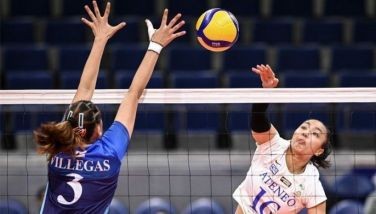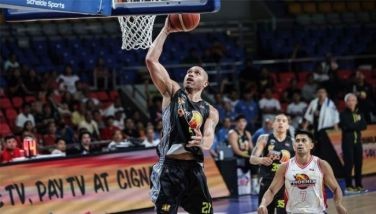More on Isley

In a story published in this section last Wednesday, FIBA technical advisor and instructor Nelson Isley admonished the Philippines for preparing poorly in the run-up to the FIBA World Cup in China.
“I heard the Philippines played a club team from Australia twice and some of their players just came out of the pro league finals to practice for one week,” said the 71-year-old former North Carolina State and Louisiana State star known as the missionary of basketball. “It was the same thing with countries that did poorly – lack of preparation. Another team Venezuela had difficulty leaving the country because of political issues and I was told they had to go to Colombia before taking a flight out to China. Ivory Coast had problems and a week before the World Cup, they weren’t sure of playing because the players went on strike, complaining they hadn’t been paid.”
Isley said he’s never been to the Philippines. “I know they love basketball in the Philippines,” he said. “If they want me to go out there, just course it through my FIBA boss Zoran (Radovic). I’ve spent time in Singapore, Malaysia, India, Sri Lanka, Japan, Iran and South Korea. I’ve gone to Iceland, Swaziland, Guatemala, Nigeria, Haiti, Zimbabwe, Tanzania, Maldives, Ethiopia and Canada. Next week, I’ll be in San Juan, Puerto Rico, for the FIBA women’s AmeriCup involving 10 countries then I’ll do a Level 1 coaching clinic in the Caribbean. Because I’m single, FIBA can call me anytime, even at midnight, to bring me anywhere. I’m home in North Carolina only two to three months in a year.”
Isley is now in China to write a technical report on the World Cup. He did the same thing at the last two Olympics. His reports go to Radovic, FIBA development director in charge of national federations. At the 2012 London Olympics, Isley sat through 76 games. “My reports look at promising players, performance of each team, statistical data, how a team prepared, conduct of the tournament, breakdown of how each game was won or lost,” he said. “The reports go to Zoran. FIBA sends them over to the IOC and they’re available to national federations on request.”
Isley retired from coaching after piloting Mozambique at the Commonwealth Games in Melbourne in 2006. He’s now full-time with FIBA. “Basketball is my life,” he said. “My mother lived until she was 102. With her genes, I hope to do positive things in basketball for many more years.”
Isley said he grew up with NBA legend Pete Maravich and was mentored by the Pistol’s father Press. “Pete averaged over 44 points a game through three years at LSU and at that time, there was no three-point shot and they didn’t include his freshman stats,” he said. “If they had the three-point shot, he could’ve averaged 60 a game. There was no better shooter than Pete ever. I remember we were roommates at a basketball clinic before we turned 10. His father was coach at North Carolina State when he recruited me out of high school. I had about 80 scholarship offers. I averaged more than 35 points as a high school senior. I chose North Carolina State because of Press but when I got there, Press decided to move to LSU. I couldn’t follow to LSU because I had committed to NC State whose new coach was Norm Sloan. I played three years at NC State then got my release to transfer to LSU. I redshirted one year so LSU gave me a two-year scholarship to play one year. My academic units at NC State were credited by LSU so I ended up earning a degree with a double major in History and Physical Education at LSU. By the time I played at LSU, Pete was already in the NBA and I played his spot.”
Isley said Maravich and Kareem Abdul-Jabbar, then known as Lew Alcindor, were the first to sign million dollar contracts in the NBA. “I think Kareem signed a $1.4 million contract in 1969 and Pete, $1.2 million in 1970,” he said. “That was big money then. I recall Press saying one day, a million dollar contract in the NBA will be peanuts. It’s true now.”
Isley said Maravich’s mother Helen was an alcoholic and committed suicide by shooting herself with a gun in 1974 at the age of 49. Press died of complications from prostate cancer in 1987 and nine months later, Pistol passed away at 40 after speaking at an evangelical gathering in Pasadena in 1988. Maravich finished his talk then did a few shooting and dribbling tricks on a court for his audience. He drank a soft drink and said, “I feel great, I just feel great.” A few seconds later, he collapsed and died on the spot. An autopsy revealed that Maravich was born without a left coronary artery and it triggered the fatal heart attack. He would’ve died in his teens but his right coronary artery compensated until it had become too enlarged and couldn’t function efficiently. Maravich played 10 years in the NBA, averaging 24.2 points, despite his heart condition.
“When Press was diagnosed with prostate cancer, Pete took him to China for herb treatment,” said Isley. “Pete had been retired from the NBA for seven years and was into meditation, holistic healing, yoga, Hinduism and all that. He became a born-again Christian. He also took Press to Germany for natural healing. Pete had a half-brother Ronnie who was his mother’s son from a previous relationship. His mother’s first husband died during World War II. Ronnie served seven years in the Vietnam War. Pete also had an adopted sister Diana.”
- Latest
- Trending































